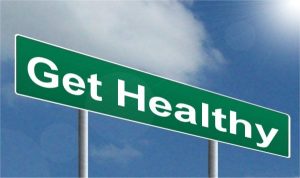Getting healthy is an important goal that can be achieved with a few significant changes to your eating habits and exercise regime. As with all diets and exercise programs, you should consider consulting a health care professional when you want to start making major changes.
Controlling your Diet
The decision to eat healthy begins with a concrete plan. Think about your current diet and how you would like to change it. It is advisable to begin with small steps rather than trying to change your habits overnight. It is also helpful to eat healthy with friends or family members. Having people that you can share your journey with and keep you on the right path can be extremely beneficial.
Fruits and Vegetables
Aim for substantial servings of fruits and vegetables per day. You can eat your favorite options and use the opportunity to discover new delicious fruits and vegetables. Look around for tasty preparations and recipes that can guide you.
Fruits are excellent for smoothies while vegetables can be prepared in different healthy ways aside from being eaten raw. Dark and leafy green vegetables such as kale and spinach, papaya, grapes, apples and berries are some of the healthy fruits and vegetables you can consume.
Whole Grains
Some common grains include wheat varieties, brown rice, quinoa, oats and barley. These provide the healthiest form of carbohydrates. There are also several whole-grain pastas as well as a variety of tasty whole-grain breads. Learn more about ketogenic diet resource here.
Lean Meat
Lean meat is determined by how much fat a specified piece of meat contains. Chicken and turkey are lean as well as some red meats. Find cuts that have loin or top in their title. Lean meats and fish are great sources of protein. They are important inclusions in a balanced diet.
Water
Water is the healthiest beverage available and offers several health benefits. Drink enough glasses of water every day. If you are finding it impossible to cut out caffeine from your diet, you can opt for black tea and coffee in moderation.
Avoid Processed Foods
Avoid eating processed foods that are excessively salty or sweet and provide minimal nutritional value. Stay away from food items that contain ingredients such as artificial colors or flavors, corn syrup and unhealthy flavor enhancers like MSG.
Regulating Meat and Dairy Products
Think about reducing meat and dairy in your diet. Many health enthusiasts believe dairy and meat should be consumed in relatively small quantities. Adding in meat and dairy is fine but the healthier options are ideal.
Home-Cooked Meals
If you usually eat out frequently, consider how you can prepare meals at home and take control of what you eat. Go through cookbooks and online recipes for inspiration. One of the aspects of becoming healthier is to change how you eat and incorporating fresh dishes and foods is important.
Carry packed lunches to school or work. This is a simple step that can help you eat much healthier and be more cautious about what you consume. The food you cook at home is likely to be healthier than what you find in restaurants, which are typically high sodium levels and preservatives.
Regular Exercise
Take a look at your current exercise program. If you are engaging in light exercising, there are various options that you can explore to stay active. If you exercise regularly, think about additional activities that you can do. New exercise classes, for example, can motivate you to become more physically active.








